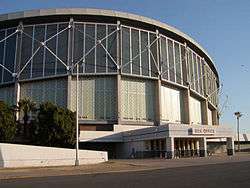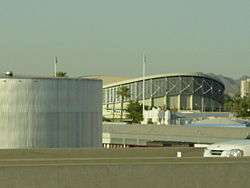Arizona Veterans Memorial Coliseum
| The Coliseum | |
 | |
| Location | 1826 West McDowell Road, Phoenix, Arizona 85007 |
|---|---|
| Coordinates | 33°28′10″N 112°5′48″W / 33.46944°N 112.09667°WCoordinates: 33°28′10″N 112°5′48″W / 33.46944°N 112.09667°W |
| Owner | Arizona Exposition and State Fair Board |
| Operator | Arizona Exposition and State Fair Board |
| Capacity |
Basketball: 14,870 Ice hockey: 13,730 |
| Construction | |
| Broke ground | August 11, 1964[1] |
| Opened | November 3, 1965 |
| Construction cost |
US$7 million ($52.7 million in 2016 dollars[2]) |
| Architect |
Lescher & Mahoney Place & Place |
| Structural engineer | T. Y. Lin International |
| General contractor | Manhattan–Dickman |
| Tenants | |
|
Phoenix Roadrunners (WHL) (1967–74) Phoenix Suns (NBA) (1968–92) Phoenix Roadrunners (WHA) (1974–77) Phoenix Racquets (WTT) (1975–78) Phoenix Roadrunners (CHL) (1977) Phoenix Roadrunners (PHL) (1977–79) Phoenix Inferno (MISL) (1980–84) Phoenix Roadrunners (IHL) (1989–97) Phoenix Mustangs (WCHL) (1997–2001) Phoenix Eclipse (ABA) (2001–02) Arizona Thunder (WISL) (1998–2000) Phoenix Flame (IBL) (2007) Arizona Derby Dames (roller derby) (2009–present) | |
Arizona Veterans Memorial Coliseum is a 14,870-seat multi-purpose indoor arena in Phoenix, Arizona, located at the Arizona State Fairgrounds. It hosted the Phoenix Suns of the National Basketball Association from 1968 to 1992, as well as indoor soccer, roller derby and professional and minor league ice hockey teams.
History
Newspaper reports state that The Arizona State Fair Commission began planning for an "Arizona State Fairgrounds Exposition Center" as early as the fall of 1962. The Commission envisioned an indoor facility which could be used during the State Fair as well as year-round. In 1964, Phoenix architect Leslie Mahoney, of the Lescher and Mahoney firm (designers of the Orpheum Theatre in downtown Phoenix among others) presented the commission with the final plans, and construction began that summer. Tucson architect Lew Place (son of University of Arizona chief campus architect Roy Place, and who later took over his father's firm) was also involved in the design. The structural engineering firm was T. Y. Lin International.
The unique saddle-shaped, tension-cable roof, supporting over 1,000 precast concrete panels, was considered innovative architectural engineering at the time. It may have been at least partially influenced by the equally innovative Dorton Arena at the North Carolina State Fair in Raleigh, completed in 1952. Veterans Memorial Coliseum also contains a series of murals by Phoenix artist Paul Coze. The design influenced later arenas' architecture, including the Capital Centre in Landover, Maryland and the Scotiabank Saddledome in Calgary, Alberta.

In April 1965, the name was officially changed to honor Arizona's war veterans. There was an early controversy over whether alcohol would be served at the new facility, but legislation was signed in April 1965 by Governor Sam Goddard providing for limited liquor sales. The Coliseum opened November 3, 1965, with a production of Ice Follies. The final cost was estimated at $7 million. On January 21, 1967, The Monkees performed a concert at AVMC, which was filmed and portions used in episode 4753 The Monkees on Tour. The episode first aired on NBC, April 24, 1967. The episode also included some footage of the band's stay at Mountain Shadows Resort.[3] On September 9, 1970 Elvis Presley kicked off his first tour after returning to live performing, here in front of a sell-out crowd of 13,000 as he did his first tour of 1973 on April 22 in front of 15,000. On October 18, 1993 Nirvana kicked off their In Utero world tour with a sold-out concert at AVMC.
Seating capacity for basketball went as followed:[4]
- 12,371 (1965–1971)
- 12,534 (1971–1975)
- 13,036 (1975–1976)
- 13,274 (1976–1977)
- 12,660 (1977–1981)
- 14,660 (1981–1985)
- 14,519 (1985–1987)
- 14,471 (1987–1989)
- 14,487 (1989–1991)
- 14,496 (1991–1992)
Tenants
This distinctive arena with its saddle-shaped roof, which sat 13,730 for ice hockey and 14,870 for basketball, was the home of the Phoenix Roadrunners of the Western Hockey League from 1967 to 1974 and the WHA from 1974 to 1977 and of the now-defunct International Hockey League from 1989 to 1997, the Phoenix Suns of the NBA from 1968 to 1992, the Phoenix Racquets of World Team Tennis from 1975 to 1978, the Arizona Thunder of the World Indoor Soccer League from 1998 to 2000, and the Phoenix Mustangs of the now-defunct WCHL from 1997 to 2001. The Coliseum was again home to pro sports starting in 2006, when the IBL's Phoenix Flame played home games there until their move to Grand Canyon University. During the Suns' tenure there, the Coliseum was affectionately referred to as "The Mad House on McDowell" (named for McDowell Road, the street in Phoenix where it is located) by both fans and the local media.
The Coliseum currently hosts the Arizona Derby Dames banked track roller derby league.
The arena hosted truck pulling sanctioned by USHRA in the late 1980s. It was frequently featured on USHRA's truck pulling series on ESPN.
The Coliseum also housed the Phoenix Inferno (also known as the Phoenix Pride) of the MISL from 1980 to 1984.
The Coliseum also hosted a Saturday Night's Main Event taping on Feb. 15, 1986 (shown on NBC on March 1, 1986) when King Kong Bundy attacked Hulk Hogan at the end of his title defense versus Magnificent Muraco. Hogan suffered (kayfabe) rib injuries, setting up their steel cage main event match at Wrestlemania 2.
It hosted the 1975 NBA All-Star Game and WCW WrestleWar 1991. The Coliseum was also host to the Phoenix Mustangs hockey team as part of the West Coast Hockey League and the Phoenix Eclipse ABA basketball team. The ABA will return to the Coliseum, as the Phoenix Phantoms have selected that arena as one of their three venues.
The arena remains open for some events, even though the Suns left in 1992 for the America West Arena (now Talking Stick Resort Arena). The Arizona State Fair schedules concerts, comedy shows and other events in the Coliseum during the Fair's annual season (which begins each October). Until recently it hosted portions of Arizona's high school basketball championships, but those have been moved to the newer Jobing.com Arena.
In the fall of 2005, the Coliseum sheltered up to 2,500 evacuees from New Orleans in the wake of Hurricane Katrina. The evacuees were relocated to other housing in time for the opening of the Fair that October.
The AVMC most recently hosted Sam Smith on his In The Lonely Hour Tour in the summer of 2015. The Phoenix Suns would also return to the Veterans Memorial Coliseum for a pre-season scrimmage on October 3, 2015 as a part of their "We Are PHX" movement, as well as unveiled signs commemorating the 50th anniversary of the Coliseum's existence.[5][6]
See also
| Wikimedia Commons has media related to Arizona Veterans Memorial Coliseum. |
- Dorton Arena
- Capital Centre
- London Velopark
- Scotiabank Saddledome
- Hyperboloid structure
- Tensile architecture
- Thin-shell structure
References
- ↑ "Break Ground for Coliseum". Casa Grande Dispatch. August 12, 1964. p. 15. Retrieved May 7, 2014.
- ↑ Federal Reserve Bank of Minneapolis Community Development Project. "Consumer Price Index (estimate) 1800–". Federal Reserve Bank of Minneapolis. Retrieved October 21, 2016.
- ↑ "The Monkees On Tour".
- ↑ "2011-2012 Phoenix Suns Media Guide" (PDF).
- ↑ "Suns help ready 'Madhouse' for team's return to its former home". 25 September 2015.
- ↑ "Suns Week of Service 2015 - Phoenix Suns".
Sources
- The Arizona Republic: May 28, 1964; April 20, 1965
- The Phoenix Gazette: April 24, 1963; March 27, 1965; October 28, 1966
- Arizona Journal: November 14, 1962
External links
| Events and tenants | ||
|---|---|---|
| Preceded by first arena |
Home of the Phoenix Suns 1968 – 1992 |
Succeeded by Talking Stick Resort Arena |
| Preceded by Seattle Center Coliseum |
Host of the NBA All-Star Game 1975 |
Succeeded by The Spectrum |